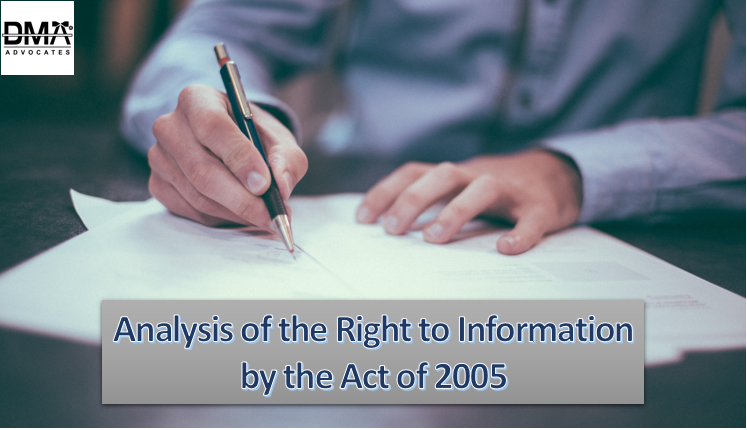With the growing changes in the country there was a requirement for greater transparency and accountability of all the organs of the government which thereby makes a compulsion on the Parliament to enact a law which could justify the growing demands of the citizens of the country. Hence came up the Right to Information Act, 2005 which abolished the Freedom of Information Act, 2002.
The reasons for abolishing of the Freedom of Information Act, 2002 was its unaccountability to have an independent appeal mechanism, it’s glut exemptions towards the public authority, non-inclusion of private bodies and the fact that it was notified but could not be brought into force because of the few reasons mentioned above and which finally gave birth to Right to Information Act, 2005.
As per the U.N General Assembly Resolution, 1946 and Universal Declaration of Human Rights, 1948 right to information is given recognition as a human right. Furthermore, it is a guaranteed right by constitution under Article 19 and 21.Supreme Court in the case of Subash Chandra Agarwal said the Right to Information Act,2005 merely recognizes the constitutional right of the citizens under Article 19(1)(a).
As per the Sec 3 of the Right to Information Act, 2005 “All citizens shall have the right to information”. The Apex court in the case of Hindustan Times vs. High court of Allahabad “It is important to make people part of the governing process”.
After 2005, Citizen of this country has right to know the information of any public authority except the one ones which are exempted by the Act under Sec 8 of the Act have clearly explained what comes under a public authority, Sec 2 of the Act defines Public Authority as a authority which is established
(i) By the constitution
(ii)By any other law of the Parliament
(iii)By any other law made by the State Legislature
(iv) Anybody controlled or substantially financed by the government
(iv) NGO substantially financed by the government
Designation of the Public Information Officers (PIO)
Every Administrative unit of the Public Authority must have a PIO at the both levels of the government.
PIO has an obligation to give the information asked by the person within 30 days of the receipt of the information seeked.
Manner of obtaining Information
The person who wants any information must request in writing or by electronic means in English or Hindi or any designated language of the State with the prescribed fee.
However, the reason for seeking such information needn’t be given to the PIO as per Sec 6 of the Act.
Disposal of Request
The request seeked by the person should be given by the PIO in 30 days of the receipt of the information. However if the request is been rejected by the PIO the reasons for such rejection, the period to file an appeal and the particular of that appellate Authority shall be given to the person who seeks such information.
Information which are exempted from disclosures
(i) Any information which prejudicially affects the sovereignty and integrity of the country
(ii) Any information which is expressly forbidden to be published either by court or by law
(iii)Any information which causes breach of privilege to the Parliament
(iv) Any information on commercial confidence or trade secrets or IPR
(v) Any information received in confidence from foreign government
(vi) Any information of cabinet papers of council of ministers or other officers
(vii) Any information which endangers the physical safety of person
(viii) Any information received in fiduciary relationship to a person
(ix) Any information relating to process of investigation or prosecution
However, there is a severability clause embedded in the Act which says where information asked has a part of information which cannot be disclosed then the rest of the information must be given, giving the reasons for non-disclosure of the rest of the information asked.
Applicability of the Act
This Act is not applicable to certain organizations like intelligence and security, Border Security Forces, Aviation Research Centre, Defense Research Organizations and all the others organization listed in the Second Schedule, as per Sec 24 of the Act.
Conclusion
To conclude I would say right to information is a weapon which is to be rightly used by both the person seeking information and the government.
“The Freedom of Information Act should be administered with a clear presumption: In the face of doubt, openness prevails. The Government should not keep information confidential merely because public officials might be embarrassed by disclosure, because errors and failures might be revealed, or because of speculative or abstract fears.”


